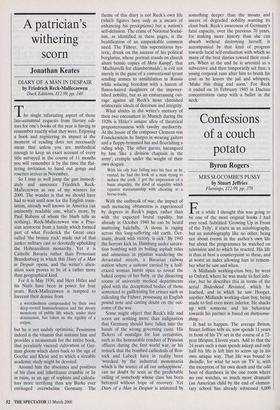A patrician's withering scorn
Jonathan Keates
DIARY OF A MAN IN DESPAIR by Friedrich Reck-Malleczewen Duck Editions, £12.99, pp. 240 he single infuriating aspect of those late-autumnal requests from literary edi- tors for one's books of the year is having to remember exactly what they were. Enjoying a book and registering its impact at the moment of reading does not necessarily mean that unless you are methodical enough to keep an exact account of every title surveyed in the course of 11 months you will remember it by the time the flat- tering invitation to hand out gongs and rosettes arrives in November.
So I may as well jump the gun immedi- ately and announce Friedrich Reck- Malleczewen as one of my winners for 2000. The wonder is that we should have had to wait until now for the English trans- lation, already well known in America (an eminently readable one, what's more, by Paul Rubens of whom the blurb tells us nothing) Reck-Malleczewen was a Prus- sian aristocrat from a family which formed part of what Frederick the Great once called 'the bronze rock' made out of that junker military cast so devotedly upholding the Hohenzollern monarchy. Yet it is Catholic Bavaria rather than Protestant Brandenburg in which this Diary of a Man in Despair opens, and the writer's alien- ation soon proves to be of a rather more than geographical kind.
For it is May 1936, and Herr Hitler and his Nazis have been in power for four years. Reck-Malleczewen is tempted to forecast their demise from
a wretchedness compounded by their own deep-rooted humourlessness and the dreary monotony of public life which, under their domination, has taken on the rigidity of a corpse,
but he is not unduly optimistic. Pessimism indeed is the vitamin that sustains him and provides a momentum for the entire book, that peculiarly visceral cultivation of Ger- man gloom which dates back to the age of Goethe and Kleist and to which a sizeable academic study might be devoted.
Around him the absolutes and positives of his class and inheritance crumble or lie in ruins, as an age of sophists and calcula- tors more terrifying than any Burke ever envisaged overwhelms Germany. The theme of this diary is not Reck's own life (which figures here only as a means of enhancing his perceptions) but a nation's self-delusion. The crime of National Social- ism, as identified in these pages, is the beatification of an unspeakable common need. The Fiihrer, 'this superstitious hys- teric, drunk on the success of his political burglaries, whose portrait stands on church altars beside copies of Mein Kampf, that `Machiavelli for chambermaids', is evil not merely in the guise of a conventional tyrant sending armies to annihilation in Russia while solacing boredom with a harem of flaxen-haired daughters of the impover- ished nobility, but as an embarrassing out- rage against all Reck's most cherished aristocratic ideals of decorum and integrity.
What abides in the writer's memory of their two encounters in Munich during the 1920s is Hitler's unique alloy of theatrical preposterousness with tawdry mediocrity. At the house of the composer Clemens von Franckenstein he barges in wearing gaiters and a floppy-brimmed hat and flourishing a riding whip. The other guests, harangued by him 'like a division chaplain in the army', crumple under the weight of their own despair.
With his oily hair falling into his face as he ranted, he had the look of a man trying to seduce the cook. I got the impression of a basic stupidity, the kind of stupidity which equates statesmanship with cheating at a horse-trade.
With the outbreak of war, the impact of such menacing obtuseness is experienced by degrees in Reck's pages, rather than with the expected brutal rapidity, but already in October 1940 he can be heard muttering balefully, 'A storm is raging across this long-suffering old earth. Ger- many, drunk with victory, is sick.' By 1943 the horrors kick in, Hamburg under satura- tion bombing with its boiling asphalt tides and amnesiacs in pyjamas wandering the devastated streets, a Bavarian railway station where a suitcase carried by a half- crazed woman bursts open to reveal the baked corpse of her baby, or the dissecting rooms of university medical departments piled with the decapitated bodies of those sentenced to guillotining for crimes such as ridiculing the Fiihrer, possessing an English pound note and casting doubt on the out- come of the war.
Some might object that Reck's bile and scorn are nothing more than indignation that Germany should have fallen into the hands of the wrong governing caste. His flickers of nostalgia for lost certainties, such as the honourable conduct of Prussian officers during the first world war, or his remark that the bombed cathedrals of Ros- tock and Lubeck have in reality been `wrecked by the industrial monomania which is the source of all our unhappiness', can no doubt be seen as the predictable railing of somebody whose class has been betrayed without hope of recovery. Yet Diary of a Man in Despair is animated by something deeper than the moans and sneers of degraded nobility wanting its clout back. Reck's awareness of Germany's fatal capacity, over the previous 70 years, for making more history than she can absorb without destroying herself, is accompanied by that kind of progress towards lucid self-realisation with which so many of the best diaries reward their read- ers. When at the end he is arrested as a subversive and then temporarily set free, a young corporal runs after him to brush his coat as he leaves the jail and whispers, `Make this thing end soon.' For Reck it ended on 16 February 1945 in Dachau concentration camp with a bullet in the neck.


















































































 Previous page
Previous page